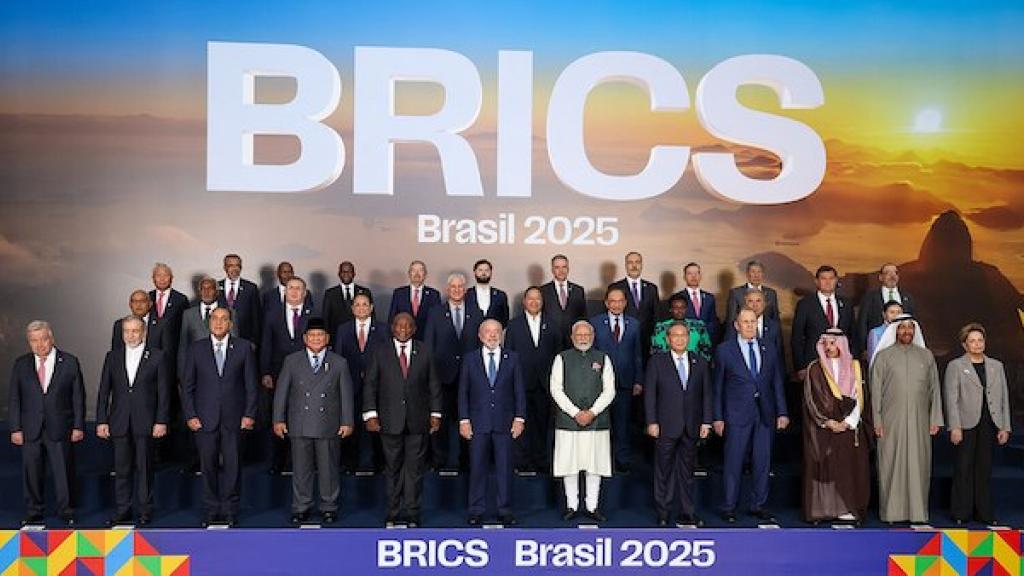by ERIC TOUSSAINT

The BRICS countries (Brazil, Russia, India, China and South Africa), which have admitted five more states (Egypt, the United Arab Emirates, Ethiopia, Indonesia and Iran), met in Rio de Janeiro on 6 and 7 July 2025. Saudi Arabia was present but did not officially join as a member country. Representatives from 20 other states considered partners were also present.
While the President of the United States is stepping up unilateral actions on both the military and commercial fronts, the BRICS countries are defending multilateralism and the United Nations system, which are in crisis. They are also defending the capitalist, productivist-extractivist mode of production that exploits human labour and destroys nature.
The BRICS countries represent half the world’s population, 40% of fossil energy resources, 30% of global GDP and 50% of growth. They have the resources to change their export-oriented capitalist development model, but they don’t want to.
It is necessary to express a clearly critical view of the BRICS. This stance in no way prevents us from denouncing, first and foremost and with the utmost firmness, the government of the United States, as well as its European and Indo-Pacific allies (Japan, Australia, etc.), for their imperialist policies.
This policy is blatantly expressed through their support for the State of Israel, which is responsible for the ongoing genocide in Gaza and military aggression against neighbouring countries. Israel is the armed wing of the United States in the region. Without Washington’s unwavering support and the complicity of Western Europe, the neo-fascist Israeli government would not be able to continue the genocide.
For their part, the BRICS countries are not taking any concrete measures as a group to effectively prevent the continuation of the massacres and genocide.
In this series of questions and answers, Eric Toussaint analyses the final declaration of the BRICS summit released on 6 July 2025, as well as the practical policies of the BRICS and the institutions they have established.
Is it true that the BRICS countries are not condemning the ongoing genocide in Gaza?
Yes. In the final declaration of the BRICS summit published on 6 July 2025, the BRICS countries do not use the term genocideto describe what is happening in Gaza. The BRICS countries criticise Israel’s use of force in points 24 to 27 of their statement, but nowhere do they use the terms “genocide”, “ethnic cleansing” or “massacre”.
What is also striking is that the part of the 6 July 2025 statement concerning Gaza is almost identical to what is found in the final statement of the previous BRICS summit held in Kazan, Russia, in October 2024 (point 30 of the final statement).
It is as if the evidence of genocide, which is mounting every day, still does not justify the clear use of this term.
Is it true that the BRICS countries are not proposing sanctions against Israel?
Yes, it is true: in their final statement, the BRICS countries did not propose sanctions against Israel. They did not propose to break the various agreements that bind them to the State of Israel. Yet the ongoing genocide and massacres of Gazans in search of food justify and demand action that goes beyond protests by the BRICS and other states.
The protests expressed by the BRICS countries were totally insufficient in October 2024 at the Kazan summit and are even more so in 2025. Only governments and multilateral bodies can take the required concrete and strong action. Of course, street demonstrations, occupations of public spaces and universities, and legal initiatives by citizens’ organisations are fundamental, but they cannot replace action by states and international institutions.
Are the BRICS countries taking concrete measures against the Israeli government?
The BRICS countries as a group are not implementing any concrete measures against the Israeli government, such as boycotts or embargoes. Admittedly, South Africa has taken the initiative of filing a complaint against Israel before the International Court of Justice in The Hague, which is positive, but its practices are at odds with this legal action. Indeed, South Africa maintains trade relations with Israel, notably by allowing South African companies to regularly export coal to Israel by ship.
Since the genocide began, it is reliably estimated that 17 shipments have taken 1.6 million tonnes of coal to fuel the Israeli grid. There have been protests attended by hundreds, called by the Palestine Solidarity Campaign, community groups in coal-mining areas, and climate activists against Glencore on 22 August 2024 and 28 May 2025 (a global day of action) and at its local partner African Rainbow Minerals on 5 April 2025; that company is run by Patrice Motsepe who is South African president Cyril Ramaphosa’s brother in law.
Links for more
